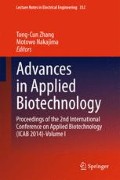Abstract
A peanut mutant with 72.53 % oleate content was selected from sodium azide mutagenized peanut Huayu 22, an export type cultivar with 51.65 % oleate content. The chemical mutant had a point mutation (C281T) in the coding region of FAD2B, which caused a T94I substitution in the FAD2B protein. Though the mutated FAD2B gene was incompletely dysfunctional as shown in yeast expression system, the peanut mutant has a high oleic acid phenotype. This indicated the possible involvement of other unidentified genetic factor(s) conditioning oleic acid content in peanut.
Access this chapter
Tax calculation will be finalised at checkout
Purchases are for personal use only
References
Liu CS, Yang M, Wang JW, Wang MX, Huang FH (2007) Effects of fatty acids on oxidation stability and low temperature fluidity of biodiesel. In: Proceedings of the 12th international rapeseed conference, pp 350–353
Norden AJ, Gorbet DW, Knauft DA, Young CT (1987) Variability in oil quality among peanut genotypes in Florida breeding program. Peanut Sci 14:7–11
Mondal S, Badigannavar AM, D’Souza SF (2011) Induced variability for fatty acid profile and molecular characterization of high mutant in cultivated groundnut (Arachis hypogaea L.). Plant Breed 130:242–247
Wang CT, Tang YY, Wang XZ, Zhang SW, Li GJ, Zhang JC, Yu SL (2011) Sodium azide mutagenesis resulted in a peanut plant with elevated oleate content. Electron J Biotechnol 14(2). doi:10.2225/vol14-issue2-fulltext-4
Chen J (2011) Advances in genetics and breeding of high oleic acid peanut. Plant Genet Resour 12(2):190–196
Okuley J, Lightner J, Feldmann K, Yadav N, Lark E, Browse J (1994) Arabidopsis FAD2 gene encodes the enzyme that is essential for polyunsaturated lipid synthesis. Plant Cell 6:147–158
Jung S, Swift D, Sengoku E, Patel M, Teule F, Powell G, Moore K, Abbott A (2000) The high oleate trait in the cultivated peanut (Arachis hypogaea L.). Isolation and characterization of two genes encoding microsomal oleoyl-PC desaturases. Mol Gen Genet 263:796–805
Wang ML, Barkley NA, Chen ZB, Pittman RN (2011) FAD2 gene mutations significantly alter fatty acid profiles in cultivated peanuts (Arachis hypogaea). Biochem Genet 49(11–12):748–759
Yang CD, Guan SY, Tang YY, Wang XZ, Wu Q, Gong QX, Wang CT (2012) Rapid non-destruction of fatty acids in single groundnut seeds by Gas Chromatograp. J Peanut Sci 41(3):21–26
Wang CT, Wang XZ, Tang YY, Zhang JC, Chen DX, Cui FG, Yu SL, Yu ST (2012) CHN Patent ZL. 200910255786.0
Patel M, Jung S, Moore K, Powell G, Ainsworth C, Abbott A (2004) High-oleate peanut mutants result from a MITE insertion into the FAD2 gene. Theor Appl Genet 108(8):1492–1502
Fang CQ, Wang CT, Wang PW, Tang YY, Wang XZ, Cui FG, Yu SL (2012) Identification of novel mutation in FAD2B from a peanut EMS mutant with elevated oleate content. J Oleo Sci 61(3):143–148
Gietz RD, Schiestl RH, Williems AR, Woods RA (1995) Studies on the transformation of intact yeast cell by the LiAc/SSDNA/PEG procedure. Yeast 11:355–360
Wang CT, Tang YY, Wang XZ, Wu Q, Yang Z, Jiao K, Song GS, Xu JZ (2013) Effect of FAD2A/FAD2B genes on fatty acid profiles in peanut seeds. Res Crops 14(4):1110–1113
Pandey M, Wang ML, Qiao L, Wang H, Feng S, Barkley NA, Wang J, Culbreath A, Holbrook C, Varshney R, Guo B (2014) Mapping FAD2 genes on peanut (Arachis hypogaea L.) genome and contribution to oil quality. In: Plant and animal genome, XXII. 11–15 January, San Diego, CA. https://pag.confex.com/pag/xxii/webprogram/Paper11835.html
Chamberlin KD, Melouk HA, Madden R, Dillwith JW, Bannore Y, Rassi ZE, Payton M (2011) Determining the oleic/linoleic acid ratio in a single peanut seed: a comparison of two methods. Peanut Sci 38(2):78–84
Acknowledgments
We would like to thank China Agricultural Research System (Grant No. CARS-14) and SAAS (Shandong Academy of Agricultural Sciences) Key Science and Technology Achievements Incubation Project (2014CGPY09) for providing financial support for this study.
Author information
Authors and Affiliations
Corresponding author
Editor information
Editors and Affiliations
Rights and permissions
Copyright information
© 2015 Springer-Verlag Berlin Heidelberg
About this paper
Cite this paper
Wang, X.Z., Wu, Q., Tang, Y.Y., Sun, Q.X., Wang, C.T. (2015). FAD2B from a Peanut Mutant with High Oleic Acid Content Was Not Completely Dysfunctional. In: Zhang, TC., Nakajima, M. (eds) Advances in Applied Biotechnology. Lecture Notes in Electrical Engineering, vol 332. Springer, Berlin, Heidelberg. https://doi.org/10.1007/978-3-662-45657-6_28
Download citation
DOI: https://doi.org/10.1007/978-3-662-45657-6_28
Published:
Publisher Name: Springer, Berlin, Heidelberg
Print ISBN: 978-3-662-45656-9
Online ISBN: 978-3-662-45657-6
eBook Packages: Chemistry and Materials ScienceChemistry and Material Science (R0)

